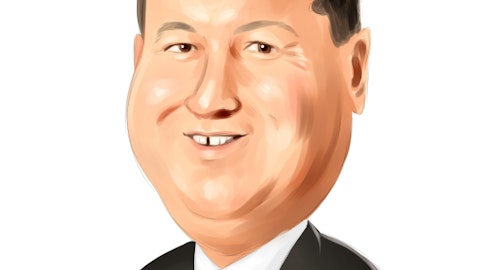Is Halliburton a good stock to buy now? A recent report from Wells Fargo’s Judson Bailey discussed the struggle of the offshore drilling industry and the affect it might have on the big oil players including Halliburton Company (NYSE:HAL), Schlumberger Limited. (NYSE:SLB), Weatherford International Plc (NYSE:WFT), and Baker Hughes Incorporated (NYSE:BHI). Bailey is afraid that it will affect the revenues and profit margins of such key industry players through 2016. The report further added, “Although we see upside in North America over the next 12-18 months and growth opportunities in the Middle East, we also see margin and revenue risk internationally through 2016 due to the severity of the offshore and deepwater downturn…” The analysis firm further added an expected weakness in North American results and lower margins in the second, third, and fourth quarters of 2015.

The shares of all the big oil companies dipped slightly on Friday, with the largest decline being in Weatherford International Plc (NYSE:WFT), with a drop of 1.18%, followed by Halliburton Company (NYSE:HAL) with a 0.90% drop, and Baker Hughes Incorporated (NYSE:BHI) with a 0.26% dip. Despite the report, Halliburton Company (NYSE:HAL) is among the large oil companies rejuvenating themselves, as its shares are up 9.08% year-to-date. Further, its first quarter 2015 fiscal results were better than the average industry results as Halliburton reported earnings per share of $0.49 over revenues of $7.1 billion, though earnings still declined by 33% and revenues fell by 2.7% year-over-year.
Halliburton Company (NYSE:HAL) has received an excellent response from hedge fund investors, showing their growing confidence in the stock. At the end of the first quarter, a total of 60 of the hedge funds tracked by Insider Monkey were bullish in this stock, a decline of 5% from the previous quarter. However, their net investments increased up to $2.99 billion from $2.57 billion during the first quarter.
We follow hedge funds because our research has shown that their stock picks historically managed to generate alpha even though the filings are up to 45-days delayed. We used a 60-day delay in our back tests to be on the safe side and our research showed that the 15 most popular small-cap stocks among hedge funds outperformed the S&P 500 Total Return Index by an average of 95 basis points per month between 1999 and 2012. After adjusting for risk, our calculations revealed that these stocks’ monthly alpha was 80 basis points. We have also been sharing and tracking the performance of these stocks since the end of August 2012, during which time they have returned 142%, outperforming the S&P 500 ETF by nearly 84 percentage points (see more details here).
We also track insider sales or purchases of stocks to see whether members of a firm’s top management are confident in the future performance of their company. In the case of Halliburton, James S. Brown, President of Western Hemisphere, and Jeffrey Allen Miller, President and Director of Halliburton, were among the insiders selling their stakes in the company. Brown sold 29,026 shares on April 27, while Miller sold 24,000 shares in multiple transactions between March 20 and May 5.
Hedge fund managers have shown interest in Halliburton Company (NYSE:HAL) during the first quarter and it might help to scrutinize their positions in the company a little further.
Halliburton Company (NYSE:HAL): Are Hedge Funds Right About This Stock?
Of the funds tracked by Insider Monkey, ValueAct Capital, managed by Jeffrey Ubben, holds the most valuable position in Halliburton Company (NYSE:HAL). ValueAct Capital has a $1.48 billion position in the stock of 33.76 million shares in its portfolio, comprising 8.2% of its 13F portfolio. Ubben is a long-term investor with an excellent track record. He probably doesn’t worry too much about HAL’s short-term performance and sees this company as a good long-term bet. He previously invested in the company and cashed out after the company’s shares climbed all the way to $70+. He is getting involved once again as share prices dipped below $40 at the end of last year. The second-most bullish hedge fund manager is value investor Glenn Greenberg of Brave Warrior Capital, with a $244.2 million position including 5.57 million shares; 7.5% of its 13F portfolio is allocated to the stock. Remaining peers with similar optimism include John Overdeck and David Siegel‘s Two Sigma Advisors, billionaire Lee Ainslie’s Maverick Capital, and billionaire Ken Griffin’s Citadel Investment Group.
Judging by the fact that Halliburton Company (NYSE:HAL) has witnessed a declination in interest from hedge fund managers, logic holds that there was a specific group of hedge funds that elected to cut their full holdings at the end of the first quarter. Interestingly, Christopher C. Grisanti‘s Grisanti Brown & Partners dropped the largest stake of all the hedgies followed by Insider Monkey, totaling an estimated $104.6 million in call options. Alec Litowitz and Ross Laser of Magnetar Capital were right behind this move, as they sold off about a $93.7 million position. These transactions are interesting, as total hedge fund interest dropped by three funds at the end of the first quarter.
What interests us in Halliburton is the increase in net invested amount and first quarter results outmatching most of the other oil industry players. Jeff Ubben is also one of our favorite fund managers to imitate. We believe Halliburton will outperform the market over the next 12-24 months.
Disclosure: None




